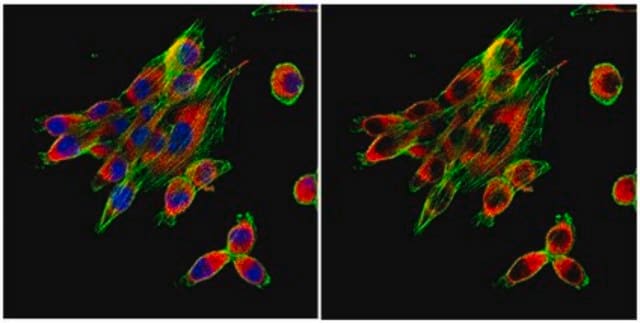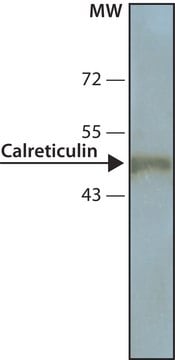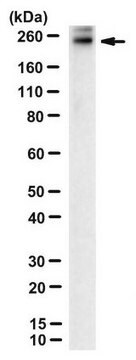208880
Anti-Calnexin, C-Terminal (575-593) Rabbit pAb
liquid, Calbiochem®
Synonym(s):
Anti-IP90, Anti-p88
About This Item
Recommended Products
biological source
rabbit
Quality Level
antibody form
purified antibody
antibody product type
primary antibodies
clone
polyclonal
form
liquid
contains
≤0.1% sodium azide as preservative
species reactivity
human, rabbit, mouse, rat, canine, guinea pig, bovine, hamster, monkey, sheep
manufacturer/tradename
Calbiochem®
storage condition
OK to freeze
avoid repeated freeze/thaw cycles
isotype
IgG
shipped in
wet ice
storage temp.
−20°C
target post-translational modification
unmodified
General description
Immunogen
Application
Warning
Physical form
Reconstitution
Analysis Note
Heat-shocked HeLa cells
Other Notes
Ou, W.-J., et al. 1993. Nature 364, 771.
David, V., et al. 1993. J. Biol. Chem.268, 9585.
Ahluwalia, N., et al. 1992. J. Biol. Chem.267, 10914.
Galvin, K., et al. 1992. Proc. Natl. Acad. Sci. USA89, 8452.
Hochstenbach, F., et al. 1992. Proc. Natl. Acad. Sci. USA89, 4734.
Wada, I., et al. 1991. J. Biol. Chem. 266, 19599.
Legal Information
Not finding the right product?
Try our Product Selector Tool.
Storage Class Code
10 - Combustible liquids
WGK
WGK 1
Certificates of Analysis (COA)
Search for Certificates of Analysis (COA) by entering the products Lot/Batch Number. Lot and Batch Numbers can be found on a product’s label following the words ‘Lot’ or ‘Batch’.
Already Own This Product?
Find documentation for the products that you have recently purchased in the Document Library.
Our team of scientists has experience in all areas of research including Life Science, Material Science, Chemical Synthesis, Chromatography, Analytical and many others.
Contact Technical Service








